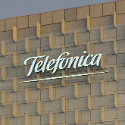Spanish operator raises full-year sales guidance and lauds progress on cost savings and debt reduction.

Telefónica raised its outlook for sales growth this year after reporting a stronger-than-expected performance for the second quarter thanks to the contribution made by its Latin American subsidiaries.
The Spanish operator said group revenues in the April-to-June period were up 1.9%, to nearly €13 billion ($15.2 billion), compared with the year-earlier period. Buoyed by cost-saving measures, net income rose 18.4%, to €821 million ($961 million), over the same period.
Telefónica is now forecasting a sales increase of 1.5% this year, having previously guided for stable revenues, although it has not made changes to expectations regarding profitability and spending.
According to its outlook, the margin for operating income before depreciation and amortization (OIBDA) should increase by "up to" one percentage point this year, while 16% of revenues will go toward capital expenditure (excluding spectrum payments). With the updated sales prediction, this implies that actual spending will be slightly higher this year than in 2016.
Telefónica's share price was boosted by the news and trading up about 3.3% in Spain at the time of publication.
Investors were undoubtedly encouraged by the reduction in Telefónica's net debt, which has been a perennial source of concern for markets over the past few years.
Last October, the operator said it would slash dividend payments this year to pay off borrowings, which had ballooned following years of takeover activity in Europe and Latin America. (See Telefónica Cuts Payouts to Combat Debt.)
More recently Telefónica has sold various subsidiaries that it does not consider to be vital strategic assets and is today focused on its main markets of Brazil, Germany and Spain. Its latest deal came in February this year, when it agreed to sell a 40% stake in its Telxius infrastructure business to investment firm KKR Group for a fee of nearly €1.3 billion ($1.5 billion).
Efforts across those various fronts have lowered net debt to about €48.5 billion ($56.8 billion) today, from €52.2 billion ($61.1 billion) in the second quarter of 2016, and mean that net debt now equates to about 3.2 times Telefónica's OIBDA last year.
That remains somewhat higher than levels reported by many of Telefónica's European rivals, but the Spanish operator is guiding for a continued decline in net debt in the second half of this year, which should further improve the ratio.
For all the latest news from the wireless networking and services sector, check out our dedicated mobile content channel here on Light Reading.
Nevertheless, the headline figures concealed some worrying indicators of performance in Telefónica's European heartlands, with revenues falling in all of its markets outside Latin America.
Executives insisted the launch of new offers was spurring improvements in Spain, but sales were down 2% in the quarter, to €3.2 billion ($3.8 billion), and OIBDA fell 1.6%, to €1.3 billion ($1.5 billion), compared with the year-earlier period.
CEO and chairman José María Álvarez-Pallete was forced to defend the performance of the Spanish business during an earnings call with analysts concerned about competition from aggressive network rival MasMovil.
"We are seeing a sequential improvement in revenue evolution and better trends and it's important that there is churn reduction in almost all segments," he said in response to questions from analysts. "MasMovil has been a disruptive element in the market but they are focused on low cost rather than value. They are capturing market share but not that much revenue share."
The contribution from the UK mobile business also suffered due to foreign exchange effects, with sales down 6.2%, to €1.6 billion ($1.9 billion), and OIBDA falling 5%, to €433 million ($507 million). In Germany, meanwhile, revenues dropped 3.4%, to €1.8 billion ($2.1 billion), but OIBDA was up 2.2%, to €461 million ($540 million).
In Latin America, however, currency movements had the opposite effect to that seen in the UK market, where Telefónica was last year blocked by regulators from selling its O2 business to 3. Sales were up 23.3% in Brazil, to more than €1 billion ($1.2 billion), and rose 6.9% across other Latin American divisions, to €892 million ($1 billion). (See Eurobites: O2 & 3 May Not Become One.)
— Iain Morris, 

 , News Editor, Light Reading
, News Editor, Light Reading
About the Author(s)
You May Also Like











